
‘This research offers scope to treat some difficult-to-treat type of cancers such as breast cancer that lacks specific markers for chemotherapy.’
Tweet it Now
Professor Karlheinz Peter, Deputy Director, Basic and Translational Science at the Baker Heart and Diabetes Institute has been working for many years with platelets, which are small blood cells in the circulation that mainly promote blood clotting (for example, platelets are the main perpetrator of a heart attack) and prevent us from bleeding when we are injured. In his recent experiments, he observed that platelets and more specifically, "activated platelets" accumulate in the area surrounding a wide range at tumor types. Based on this observation, Prof Peter's team has now developed a new imaging and platelet targeting chemotherapy agent for the early detection and treatment of cancers. "We have shown that we can image activated platelets to detect tumors with clinically available imaging technologies such as ultrasound and PET/CT," he said.
"This unique approach holds great promise both for the diagnosis and therapy of a broad range of tumors. It provides a new treatment option particularly for difficult to treat cancer types that lack specific markers for therapy with conventional chemotherapy such as breast cancer etc...," said Prof Karlheinz.
"This activated platelet targeted chemotherapy approach also provides the means to deliver high concentrations of chemotherapy specifically to tumor cells whilst minimizing side effects and preventing tumor growth.
"This highly promising and unexpected discovery with immense importance for cancer diagnosis and therapy emerged from years of research on the function of platelets in heart disease. It is a good example of the importance of funding in basic research which often produces unexpected but highly relevant discoveries that ultimately will provide benefit for patients."
Advertisement
Advertisement








